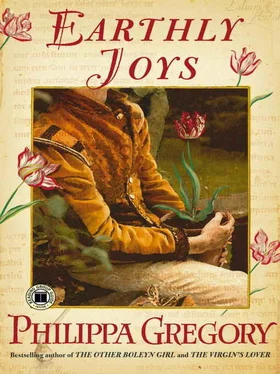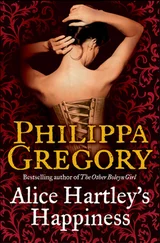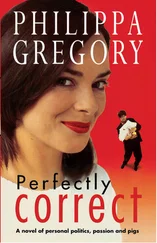“What d’you mean?”
“When they throw a sport, when from one main stem you can see another grow different, and if you take the different one you can breed another from it – God didn’t make that, surely? I made it.”
The vicar shook his head but John went on. “And daisies are not the same wherever they grow. I have seen a Kent daisy different from a Sussex daisy and a French daisy which was bigger and tipped with pink. I don’t know how many daisies there are. A man would have to travel the whole world over with his eyes on his boots all the way to be sure. Why should such a thing be? Why should God make hundreds of the same thing?”
The vicar glanced around for rescue but nobody was looking his way. “God in His wisdom gave us a world filled with variety,” he began.
He was relieved to see that Tradescant was not arguing. This was not a man who was quarrelsome in his cups. This was a man urgently in quest of a truth. The vicar had an odd sense of a man in search of his destiny. Tradescant was concentrating, passionately concentrating, with a deep line engraved between his brows as he listened to the vicar’s answer. “It was God’s great wisdom to give us many things of great beauty. We cannot question His choice to give us many things which are only a little different, one from another, if you tell me that is how they are.”
Slowly John shook his head. “I don’t mean to question my God,” he said humbly. “Any more than I would question my lord. It just seems odd to me. And God did not make all things at once in Eden, and give them to us. I know that cannot be, though I read it in the Bible, because I see them changing from season to season.”
The vicar nodded, quick to move on. “That is no more than a craftsman making a table, I suppose. It is using the skills which God has given you and the materials which He has provided to make something new.”
John hesitated. “But if I made a new daisy, say, or a new tulip, and a man came along and saw it growing in a garden, he would think it was the work of God and praise Him. But he would be wrong. It would have been my work.”
“Yours and God’s,” the vicar said smoothly. “For God made the parent tulip from which you made one of another color. Undoubtedly it is God’s purpose to give us many things of beauty, many things which are rare and different and strange. And it is our duty to thank Him and praise Him for them.”
John nodded at the mention of duty. “It would be a man’s duty to gather the varieties?” he asked.
The vicar drank a little wedding ale. “It could be,” he said judiciously. “Why would a man want to collect varieties?”
“To the glory of God,” John said simply. “If it is God’s purpose that we should know His greatness by the many varieties of plants that are in the world now, and that can be made, then it is to the glory of God to make sure that men know of His abundancy.”
The vicar thought for a moment, fearful of heresy. “Yes,” he said cautiously. “It must be God’s will that we know of His abundancy, to help us to praise Him.”
“So a man making a garden, a fine garden, is like a man making a church,” John said earnestly. “Showing men the glory of God as a stonemason might carve the glory of God into his pillars and gargoyles.”
The vicar smiled. “Is that what you want to do, Tradescant?” he asked, seeing his way at last to the heart of it. “Being a gardener and digging up weeds is not enough for you – it has to be something more?”
For a moment John might have disclaimed the idea, but the strong wedding ale was working on him and his pride in his work was powerful. “Yes,” he admitted. “It is what I want to do. My Lord Cecil’s gardens are to his glory, to be a setting to his fine house, to show the world that he is a great lord. But the gardens are also a glory to God. To show every visitor that God has made abundant life, life in such variety that a man could spend all his days finding it and collecting it and still not see it all.”
“You have your life’s task then!” the vicar said lightly, hoping to end the conversation. But John did not smile in return.
“I have indeed,” he said seriously.
At the end of the dinner Gertrude rose from the table and the ladies followed her lead. The serving girls stayed behind with the poorer neighbors and drank themselves into a satisfying stupor. Elizabeth completed the last of the tasks in her old family home and waited for John in his turn to leave the dinner. At dusk he came away from the hall and the trestle tables and found her sitting at the kitchen table with the other women, waiting for him. He took his bride by the hand and they went down the hill a little way to their new cottage followed by a shouting, singing train of family and villagers.
In the cottage the women went upstairs first, and Elizabeth’s cousins and half sisters helped her out of her new white dress and into a nightdress of fine lawn. They brushed her dark hair and combed it into a fat plait. They pinned her cap on her head, and sprayed her with a little water of roses behind each ear. Then they waited with her in the little low-ceilinged bedroom until the shouts and snatches of song from the stair told them that the bridegroom had been made ready too and was come to his bride.
The door burst open and John was half-flung into the room by the joyous enthusiasm of the wedding party. He turned on them at once and pushed them out over the threshold. The women around Elizabeth’s bed made false little cries of alarm and excitement.
“We’ll warm the bed! We’ll kiss the bride!” the men shouted as John barred their way at the door.
“I’ll warm your backsides!” he threatened and turned to the women. “Ladies?”
They fluttered like hens in a coop around Elizabeth, straightening her cap and kissing her cheek, but she brushed them off and they pattered to the door, ducking under John’s arm as he held the door firmly. More than one woman shot a quick look at the gardener and the strength of his outstretched arm and thought that Elizabeth had done better than she could possibly have hoped for. John closed the door and shot the bolt on them all. The rowdiest hammered on the door in reply. “Let us in! We want to drink your healths! We want to see Elizabeth to bed!”
“Go away! We’ll drink our own healths!” he shouted back. “And I shall bed my own wife!” He turned, laughing, from the door but the smile died from his face.
Elizabeth had risen from her bed and was kneeling at the foot, her head in her hands, praying.
Someone hammered on the door again. “What are you going to plant, Gardener John?” they shouted. “What seeds do you have in your sacks?”
John swore under his breath at their bawdy humor, and wondered that Elizabeth could stay so still and so quiet.
“Go away!” he shouted again. “Your sport is over! Go and get drunk and leave us in peace!”
With relief he heard the clatter of their feet going downstairs.
“We’ll be back in the morning to see the sheets!” he heard a voice shout. “We expect stains, glorious red and white stains!”
“Roses and lilies!” shouted one wit. “Red roses and white lilies in John Tradescant’s flower bed!” There was a great guffaw at this sally, and then the front door of the cottage banged, and they were in the streets.
“Dig deep, Gardener John!” came the shout from the darkness outside. “Plant well!”
John waited until he could hear the staggering footsteps go up the lane to the village’s only ale house. Still Elizabeth kneeled at the foot of the bed, her eyes closed, her face serene.
Hesitantly John kneeled down beside her, closed his eyes and composed himself for prayer. He thought first of the king – not the man he saw and knew, but the man he thought of when he said the word “king” – a being halfway between earth and heaven, the fount of law, the source of justice, the father to his people. A man like the Lord Jesus, sent from God, directly from God, for the guidance and good ruling of his people. A man whose touch could heal, who could perform miracles, whose mantle covered the nation. “God save the king,” Tradescant whispered devoutly.
Читать дальше
Конец ознакомительного отрывка
Купить книгу












